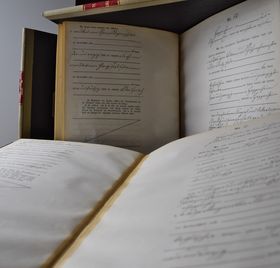Genealogical research is always carried out step by step. You begin by looking through your own documents, such as birth certificates or family records, or by asking relatives for information about ancestors. If possible, you can consult this information with relevant evidence found in literature or you can research on the Internet.
It is always necessary to have knowledge of the place where a birth, marriage or death took place, since civil registers are not accessible for any place or age group by name index. With the help of historical local-dictionaries, territorial affiliations of a locality can be determined.
The registry office registers are the central source for the creation of family tables. From January 1st, 1876, the register was introduced throughout the German Empire. This means that since 1876 births, marriages and deaths have no longer been recorded in church registers, but in state registers. Since the amendment of the Civil Status Act on 01.01.2009, these registers can be used after expiry of the continuation periods in accordance with the archiving requirements.
The following continuation periods apply:
- Birth register: 110 years
- Marriage register: 80 years
- Death register: 30 years


